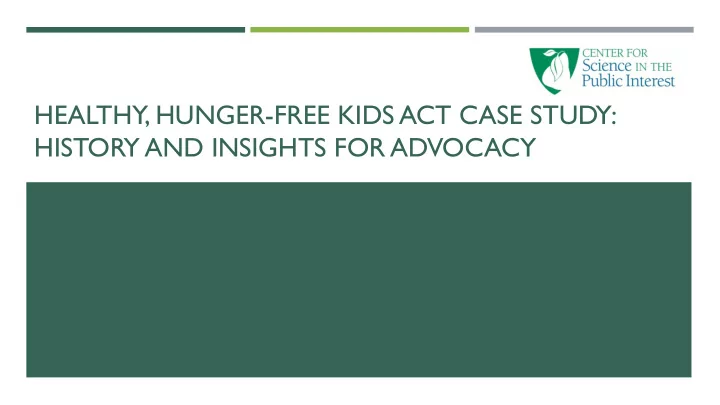

HEALTHY, HUNGER-FREE KIDS ACT CASE STUDY: HISTORY AND INSIGHTS FOR ADVOCACY
What are the school meals programs? National School Lunch Program: nearly half of all children in the U.S. (more than 30 million). School Breakfast Program: more than 14 million children. Taxpayer investment in both programs over $16 billion in FY2019. Meals, snacks, beverages must meet nutrition standards Every 5 years Congress takes up Child Nutrition Reauthorization (CNR)
Importance of strong school nutrition standards for low-income children Helps close the gap in healthier food access between higher and lower- income schools Helps reduce stigma Decreases obesity among low-income students
The majority of participants are low- income School lunch: 73% School breakfast: 85% Participation is increasing among low-income children School lunch: 15.5m in 2000 to 22m in 2017 School breakfast: 7.5m in 2000 to 12.4m in 2017
How are things going? Virtually all school districts serving healthier lunches with more whole grains, fruits and vegetables, less salt and trans fat.
IMPORTANCE OF HHFKA
IMPORTANCE OF HHFKA
Impact of the Healthy, Hunger-Free Kids Act Updated school meal and snack standards: prevent more than 2 million cases of childhood obesity and save $792 million over ten years. The Healthy, Hunger- Free Kids Act is “one of the most important national obesity prevention policy achievements in recent decades.” - Harvard School of Public Health, 2015
Research questions Provide an in-depth look into how HHFKA came to pass to inform other nutrition and public health policy advocacy initiatives Case study covers 2003 to 2015 Focus on nutrition standards
SO HOW DID ADVOCATES DO IT?
1990s: First identify the problem and the solution Research Childhood obesity increasing Unhealthy school foods Policy cost-effective, sustainable Early advocacy success: 1994 CNR meals based on Dietary Guidelines for Americans
2000s: Tactics used leading up to HHFKA Build consensus and coordinate action Build momentum at national, state, and local level CSPI cultivated interest and technical assistance to pass policies Use the research for advocacy Bring industry to the table Diffuse opposition
2000s: Leading up to HHFKA Competitive foods (snacks and beverages) Congressional legislation (2005-2010) Institute of Medicine report (2007) USDA and CDC case studies, CSPI state report cards Bipartisan and industry support by 2006 Amendment to 2007 farm bill School meals Bush Administration contracted Institute of Medicine report on school meals (released in 2009)
Moment of opportunity Perfect storm Nontraditional and new partners Use of research Funders Communications
Getting HHFKA to the finish line Challenges Anti-hunger groups preferred House CNR bill Senate CNR bill SNAP offset How challenges have been resolved Bridge organizations
Healthy, Hunger-Free Kids Act passes!
After the law passes: regulations and defense
Implementation and defense of HHFKA Implementation Comment on regulations 240,000 of the 135,000 of the 247,800 comments on 138,000 comments on competitive foods meal standards
Defense of HHFKA Opposition First came pizza as a vegetable
Defense of HHFKA Additional opposition Limits on french fries Whole-grain rich requirement Sodium reduction targets Countering the opposition Work with USDA and White House
Key takeaways
Key takeaways: Policy National policy change often takes time 20 years leading up to HHFKA State and local momentum Passing legislation first step of the process: implementation and defense essential Timing (and luck) plays a role: “All the stars aligning”
Key takeaways: Advocacy Parents, concerned citizens, health professionals, and local leaders have power, but do not always realize it Grassroots involvement essential Mix of research and real-life success stories Make up for limited resources through coalitions Differences of opinion between allies as much of a barrier as opposition from legislators or industry
Key takeaways: Industry Food industry not monolithic Public health organizations can have different motives than industry, yet still work together Advantage of national nutrition policy easier and less expensive for industry than different policies in states and localities Industry can respond to changing demand
THANK YOU
Recommend
More recommend